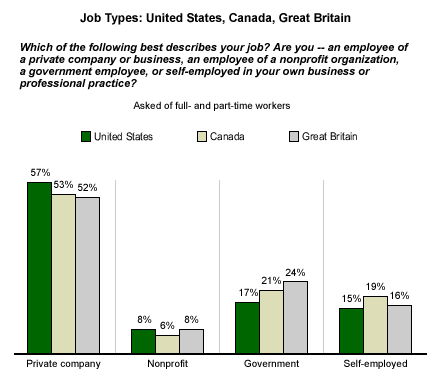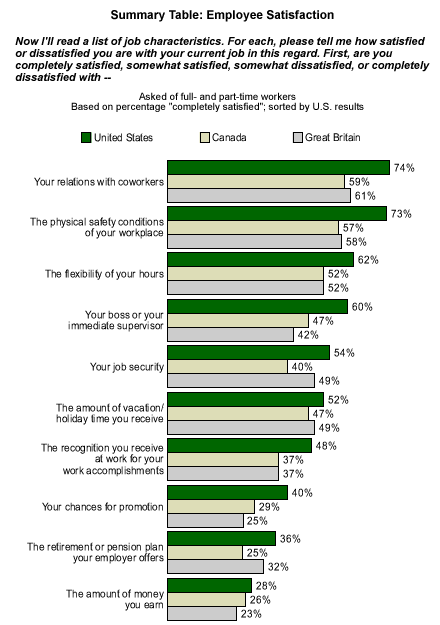Western Europeans may be lamenting summer's end more than most Americans -- they're likely to have taken a month of vacation, compared with an average of about two weeks in the United States, according to a recent study on vacation habits. How much truth is there to the popular stereotyping of the American workaholic and the lifestyle-oriented European? According to recent Gallup polling in the United States, Canada, and Great Britain*, American workers do work a little longer -- but they are also more satisfied with many aspects of their jobs than are their Canadian and British counterparts.
The three polls take an in-depth look at how work is perceived in the United States, Great Britain, and Canada. Additionally, the polls provide insight into the different characteristics of working life in these three countries -- containing data on nature of employment, hours of work and satisfaction with pay, promotion opportunities, recognition, and retirement benefits, among other factors.
Where People Work
In each of the three countries surveyed, about one in every two respondents reported having a full-time job. The comparative distribution among work sectors is mostly the same, except for one minor divergence: Great Britain has a slightly larger public sector than the United States, with nearly one in every four Britons (24%) employed in a government job, compared with 17% of Americans.

How Long People Work
Workers in all three nations report spending close to 40 hours a week on the job, on average: Americans work 42 hours, Canadians 41 hours, and Britons 39 hours. However, Americans do live up to their workaholic reputation in one sense -- 38% of Americans say they work more than 45 hours every week, versus 30% of Canadians and 28% of Britons. On the other hand, 20% of Britons work fewer than 34 hours a week, compared with 12% Americans and 9% of Canadians.

When looking at specific attributes of their jobs -- such as pay, vacation time, bosses, coworkers and chances for promotion, a majority of workers in all three countries are satisfied.
On 7 of the 10 workplace attributes and job characteristics that Gallup tested, American workers are more likely to express "complete" satisfaction than do their counterparts in Great Britain and Canada. The most striking differences are between the percentages in each country that express this level of satisfaction with their relations with coworkers, the physical conditions of their workplaces, their bosses or supervisors, and their opportunities to be promoted.
When it comes to pay packages, employer-sponsored retirement plans, and the amount of vacation they receive, the gap in satisfaction among workers in each county narrows. Britons, Americans, and Canadians are equally likely to say they are completely satisfied with the amount of money they earn (28% in the United States, 26% in Canada, and 23% in Great Britain). Britons (32%) and Americans (36%) are as likely to be completely satisfied with the retirement plans or pensions their employers offer. Only a quarter of Canadians, however, are completely satisfied with their retirement plans. Similar percentages of Canadians (47%), Britons (49%), and Americans (52%) are completely satisfied with the vacation time they receive.

Bottom Line
One key to why many Americans are willing to work longer hours could be that they're more likely to see greater potential reward. While 40% of Americans are completely satisfied with opportunities for promotion in their jobs -- only 29% of Canadians and 25% of Britons are as fortunate. Coupled with the fact that American workers are more satisfied with their work environment than the Canadians and British, this finding suggests that though Americans may work longer hours, they may not begrudge their neighbors the extra free time.
*Results in the United States are based on telephone interviews with 1,017 national adults, aged 18 and older, conducted Aug. 9-11, 2004; 1,005 national adults, aged 18 and older, conducted July 8-11, 2004; 2,250 national adults, aged 18 and older, conducted June 9-30, 2004; and 1,000 national adults, aged 18 and older, conducted May 2-4, 2004. For results based on the total sample of national adults, one can say with 95% confidence that the maximum margin of sampling error is ±3 percentage points. The survey was conducted by Gallup USA.
Results in Canada are based on telephone interviews with –1,005-- national adults, aged 18 and older, conducted Aug. 30-Sept. 6, 2004. For results based on the total sample of national adults, one can say with 95% confidence that the maximum margin of sampling error is ±3 percentage points. The survey was conducted by Gallup Canada.
Results in Great Britain are based on telephone interviews with 1,009 national adults, aged 18 and older, conducted Aug. 25-Sept. 7, 2004. For results based on the total sample of national adults, one can say with 95% confidence that the maximum margin of sampling error is ±5 percentage points. The survey was conducted by Gallup UK.
In addition to sampling error, question wording and practical difficulties in conducting surveys can introduce error or bias into the findings of public opinion polls.